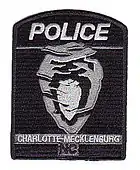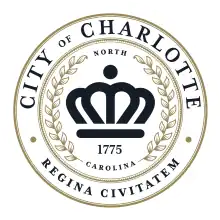Charlotte-Mecklenburg Police Department
The Charlotte-Mecklenburg Police Department (CMPD) is the police department of Mecklenburg County, North Carolina, United States, which includes the City of Charlotte. With 1,817 officers and 525 civilian staff as of 2020, covering an area of 438 square miles (1,130 km2) with a population of nearly 900,000, it is the largest police department between Washington, D.C., and Atlanta, Georgia.[1][3]
| Charlotte-Mecklenburg Police Department | |
|---|---|
 | |
| Common name | Charlotte Police Department |
| Abbreviation | CMPD |
| Agency overview | |
| Formed | 1993 |
| Preceding agencies |
|
| Employees | 2,342 (2020) |
| Annual budget | $290 million (2021)[1] |
| Jurisdictional structure | |
| Operations jurisdiction | Charlotte, North Carolina, United States |
| Governing body | Charlotte City Council |
| General nature | |
| Operational structure | |
| Sworn members | 1,982 (2020)[2] |
| Unsworn members | 475[2] |
| Agency executive |
|
| Units | List
|
| Commands | List
|
| Facilities | |
| Divisions | 13 |
| Website | |
| CMPD | |
The CMPD is by statute "county police" in that it has jurisdiction anywhere in Mecklenburg County.[4] The unique status of this situation makes the CMPD "metro" police.[5]
History
The CMPD was formed in 1993 with the merger of the former Charlotte City Police Department and the Mecklenburg County Rural Police Department. Mecklenburg and neighboring Gaston County were the two counties out of the state's 100 counties to have county police in addition to the sheriff's offices. County police perform law enforcement tasks in the county with police powers anywhere in the county just like the sheriff, but the sheriff primarily handled the courts and jails. The North Carolina General Assembly approved legislation combining the two agencies.
In 2013, press reports indicated that the Citizens Review Board had ruled against citizens complaining of police misconduct in every case brought before the panel in its fourteen-year history.[6]
Shooting of Jonathan Ferrell
On September 13, 2013, 23-year-old Jonathan Ferrell was shot ten times and killed by Charlotte-Mecklenburg Police Department Officer Randall Kerrick, after Ferrell's car broke down and he had knocked on a person's door for help in the early hours of the morning. Police arrived at the scene in response to a report of suspicious behavior and possible breaking and entering. Ferrell was unarmed, refused police orders to stop, and continued running towards Kerrick. Ferrell was first Tasered and then shot. A lawsuit filed by Ferrell's family against the city was settled for $2.25 million in 2015. Kerrick is currently being tried for voluntary manslaughter. On August 21, 2015, the manslaughter charge was declared a mistrial on the basis of 8-4 jurors (in favor of acquittal).[7]
Shooting of Keith Lamont Scott
The shooting of Keith Lamont Scott, a 43-year-old African American man, occurred on the afternoon of September 20, 2016, in Charlotte, North Carolina. Plainclothes police officers arrived at an apartment complex about a mile from the University of North Carolina at Charlotte to search for another man for whom they had outstanding warrants. Once there, they saw Scott in his SUV allegedly smoking cannabis and handling a handgun. They left and called for backup, as they were not marked as police officers at the time. Once other officers arrived, they approached Scott's vehicle with weapons drawn and ordered him to drop his gun and exit the vehicle. Scott did not initially respond. The original unmarked officers, now wearing CMPD plate carriers, moved to the rear of Scott's vehicle and broke out a rear window, presumably to pressure Scott out. Scott exited the vehicle, gun in hand, and stood in front of several alert officers. The officers ordered him to drop the gun a total of 17 times, which he allegedly refused to do. Officer Brentley Vinson (a Black African American & two-year veteran of the police force) fatally shot Scott; he has been placed on paid administrative leave.[8]
The shooting sparked riots, which continued on into the morning of the next day and subsequent night.
The shooting occurred in the parking lot of the Village at College Downs apartment complex on Old Concord Road, where CMPD officers were searching for an unrelated suspect with outstanding warrants.[9] Scott, who was parked in the lot, allegedly exited his vehicle armed with a handgun, and then immediately returned to his vehicle.[9] Mistaking Scott for the suspect they were looking for, officers began to approach Scott's vehicle when he again exited the car, still armed. The officers then allegedly gave Scott numerous loud verbal warnings to drop his weapon, which many witnesses at the scene heard.[9] When Scott allegedly refused to comply, Officer Brentley Vinson fatally shot Scott, who died at the scene.
Despite neither woman being at the scene, and the sister being asleep, both Scott's sister and daughter claimed that he was in his car reading a book when he was gunned down by the officer, but no book was found there.[10][11] CMPD Chief Kerr Putney told reporters that a handgun was seized at the scene, and a photo of the gun was released by WBTV.[11] Several witnesses at the scene also observed the weapon, and not a book.
Organization
The CMPD is organized into the Office of the Chief of Police, who is assisted by five deputy chiefs.
Patrol services fall under the Field Services Group, headed by a deputy chief. The Field Services Group is divided into three service areas, each headed by a major. Each service area comprises four to five patrol divisions, each headed by a captain. Each patrol division consists of two response areas, each headed by a lieutenant.[12]
Other groups contain bureaus, headed by majors. Each bureau is also organized into divisions, commanded by captains, and units, commanded by sergeants.[12]
Personnel
As of 2020, the department consisted of 475 unsworn and 1,982 sworn personnel, including 1 chief of police, five deputy chiefs, 14 majors, 35 captains, 45 lieutenants, 157 sergeants, and 1,725 detectives and officers.[2]
Breakdown of the makeup of the rank and file of Charlotte-Mecklenburg Police Department:[13]
- Male: 86%
- Female: 14%
- White: 80%
- Black: 18%
- Hispanic: 1%
- Asian: 1%
Equipment
Weapons
CMPD officers are issued the Glock 17. Qualified officers may also be equipped with a shotgun and/or patrol rifle.[14]
Vehicles
The department utilizes a variety of vehicles, including but not limited to:
- Chevrolet Caprice
- Dodge Charger
- Ford F-350
- Ford Police Interceptor Sedan (Ford Taurus)
- Ford Police Interceptor Utility (Ford Explorer)
Rank structure
| Title | Insignia | Insignia (dress uniform cuff) | Positions |
|---|---|---|---|
| Chief of Police | 5 gold stripes | Department Head | |
| Deputy Chief | 4 gold stripes | Group CO | |
| Major | 3 gold stripes | Bureau or Service Area | |
| Captain | 2 gold stripes | Division[15] | |
| Lieutenant | Gold stripe | Response Area[15] | |
| Sergeant | Unit | ||
| Detective | No insignia | ||
| Police Officer | No Insignia |
The insignia of the Chief of Police was two gold stars until 2014, when Chief Rodney D. Monroe upgraded it to four stars.[16]
- Former ranks
| Title | Insignia | Insignia (dress uniform cuff) | Dates used | Notes |
|---|---|---|---|---|
| Assistant Chief | 4 gold stripes | 2017–2020 | Created in 2017, in the role of assistant to the Chief of Police.[17] Discontinued by 2020.[18] | |
| Staff Sergeant (Response Area Commander) | 2008–2014 | Introduced in 2008, response area commanders oversaw response areas within a district, and held the rank of staff sergeant. The rank of response area commander (staff sergeant)[19] served as a stop-gap rank before the rank of lieutenant was officially approved as a replacement.[5] The rank of lieutenant, used by the Charlotte Police Department until the 1990s, was reintroduced in 2011 for response area commanders; 26 sergeants were promoted to lieutenant in January 2012,[20] and by 2013 all response area commanders had been regraded as lieutenants.[21][22] However, the rank of staff sergeant was retained through 2014, when the remaining holders of the rank were promoted to lieutenant.[23][24] | ||
Response Areas
| Field Services Patrol Group | Patrol Divisions |
|---|---|
| Patrol North |
|
| Patrol Central |
|
| Patrol South |
|
References
- Sullivan, Carl; Baranauckas, Carla (June 26, 2020). "Here's how much money goes to police departments in largest cities across the U.S." USA Today. Archived from the original on July 14, 2020.
- "CMPD 2020 Integrated Annual Report". CMPD. City of Charlotte. 2021. Retrieved October 16, 2021.
- "Our Organization - Home". Retrieved June 29, 2019.
- "Our Response Areas". Charlotte Mecklenburg Police Department. Retrieved June 4, 2017.
- "2010 Annual Report" (PDF). Charlotte-Mecklenburg Police Department. Retrieved July 17, 2015.
- "Woman 'felt dismissed' after filing complaint against CMPD", by Fred Clasen-Kelly, Charlotteobserver.com, February 26, 2013
- "City reaches $2.25 million settlement in Ferrell civil lawsuit". Time Warner Cable News. May 14, 2015.
- ""Charlotte protest: One person shot during violence; officer wounded"".
- "Gun recovered at fatal Charlotte police shooting was reported stolen, sources say". charlotteobserver. Retrieved December 18, 2018.
- "Video shows moments before Keith Lamont Scott's shooting". CNN.
- Staff, WBTV Web. "Source: Picture appears to show gun next to Keith Lamont Scott's body". wbtv.com. Retrieved December 18, 2018.
- "CMPD: Our Response Areas". CMPD. City of Charlotte. Retrieved October 16, 2021.
- Law Enforcement Management and Administrative Statistics, 2000: Data for Individual State and Local Agencies with 100 or More Officers Archived September 27, 2006, at the Wayback Machine
- https://charlottenc.gov/CMPD/Documents/Resources/CMPDDirectives.pdf
- "Metro Division". Charlotte-Mecklenburg Police Department. Retrieved July 17, 2015.
- Fascinating facts - see image
- "CMPD Promotes New Assistant Chiefs". WCCB Charlotte. July 14, 2017. Retrieved June 29, 2018.
- "Our Organization: Office of the Chief". CMPD. City of Charlotte. Retrieved October 16, 2021.
- Charlotte Observer, 8 March 2013
- CMPD promotes officers Archived March 6, 2012, at the Wayback Machine
- "Providence Division". Charlotte-Mecklenburg Police Department. Retrieved July 17, 2015.
- Introduction of Lieutenant rank Archived May 15, 2014, at the Wayback Machine
- 2013 City of Charlotte salary database - Police Archived May 14, 2014, at the Wayback Machine
- "CMPD promotes 23 officers," 12 May 2014
